Each month, GCSE spotlights one Member organization and the importance of sustainability at the institution and the institution's role in informed environmental decision-making.
Dallas College
Since 1965, Dallas College has served more than 3 million students. Dallas College has been a member of GCSE since 2013 and one of the first community colleges to join and participate in the GCSE Leaders’ Alliance. Dallas College strengthens their community by modeling, teaching, and serving as an anchor institution for sustainable development in the Dallas-Fort Worth Metroplex.
Dallas College is educating and empowering more than 100,000 students each year to make sustainable decisions that help create an equitable society, a healthy environment, and a thriving economy. Dallas College is the only two-year college in Texas to earn a rating (Silver) from the Association for the Advancement of Sustainability in Higher Education (AASHE) on the Sustainability Tracking, Assessment and Rating System (STARS).
Their commitment to sustainability impacts everyday decisions — from academic offerings to campus architecture and campus operations. They are champions of sustainable solutions, and also encourage their students, employees, business partners and community members to seek sustainable solutions. Their local and global sustainability efforts include:
 Free educational outreach programs and events that engage hundreds of students and community members each year (e.g., Sustainable U Speaker Series, an annual Sustainability Summit and E-waste recycling events at seven locations throughout their service area)
Free educational outreach programs and events that engage hundreds of students and community members each year (e.g., Sustainable U Speaker Series, an annual Sustainability Summit and E-waste recycling events at seven locations throughout their service area) - Departmental specific programs such as Sustainable Purchasing and Energy Efficiency
- Regular workshops to teach faculty how to infuse sustainability into their existing courses
- Collaboration with the cities they serve to connect students, faculty and employee’s projects to city initiatives. For example, Dallas College served as a convener for stakeholder participation in the design phase of the City of Dallas Comprehensive Environmental & Climate Action Plan (CECAP).
- Efforts to serve as science advisor to local decision-makers. For example, a Dallas College employee who serves on of the Environmental Commission advises the City Council on issues related to the environment and sustainability, as well as providing guidance on the implementation of CECAP.
- Projects to encourage students and faculty to be Global citizens, participate in the Global Citizenship Alliance (GCA) and promote education for engaged knowledge and responsible action in an interdependent world.
Did you know?
Dallas College’s downtown campus, El Centro, has experimented with adding electricity-generating wind turbines on the roof several times. Ironically, the neighboring high-rise buildings create a wind tunnel, and none of the prototypes have been able to withstand the fierce winds.
Yale School of the Environment
The Yale School of the Environment (YSE) is helping to lead the world toward a sustainable future with cutting-edge research, teaching, and public engagement on society’s evolving and urgent environmental challenges. YSE strives to break new ground in a wide array of areas, including biodiversity, climate change, energy, environmental justice, industrial ecology and green chemistry, urban systems, and wildlife ecology.
Located on Science Hill on Yale University’s campus in New Haven, Connecticut, YSE offers four master’s programs, a doctoral program, and 14 combined and joint degree programs in collaboration with departments and schools across Yale, as well as with external partner institutions. Each degree program is designed to foster interdisciplinary collaboration and incorporates diverse perspectives on critical environmental issues. To further promote interdisciplinary collaboration, YSE has created learning communities, such as Business and the Environment and Environmental Policy Analysis, that provide students with expanded education, training, and career opportunities, enabling them to pursue areas of research and professional interest, regardless of degree specialization. In addition, the Forest School at YSE serves as a forest-centric educational and research hub, bringing together cross-disciplinary research in science and practice to find solutions to the challenges that threaten the world’s forests.
YSE also has 20 affiliated centers and programs that fuel innovative research, sponsor student internships, and host conferences and events that engage citizens and policymakers. Their foci are wide-ranging — from the Yale Program on Climate Change Communication (YPCCC), known for its novel scientific studies on public opinion and behavior on climate change; to the Center for Green Chemistry & Green Engineering at Yale, committed to providing practical solutions to sustainability challenges; to the Environmental Leadership & Training Initiative (ELTI), a unique program that has trained over 8,000 participants in tropical forest restoration globally.
There are currently more than 5,500 YSE alumni working around the world to protect and restore our environment. They are negotiating international climate agreements on behalf of vulnerable small islands and low-lying coastal developing states, launching groundbreaking conservation efforts for threatened species such as snow leopards and the Golden Mahseer, and building the world’s first commercial, land-based coral farming company for reef restoration, among numerous other high-impact endeavors that are leading us toward a sustainable future.
Did you know?
The Yale School of the Environment manages the Yale Forests —10,880 acres of forestland in Connecticut, New Hampshire, and Vermont that provide educational, research, and professional opportunities to the Yale community and beyond.
Photo credit: Rob Mattson/Noble Research Institute
Michigan State University
Re-engaging international partners to address global environmental challenges at Michigan State University
The Environmental Science and Policy Program (ESPP) is an umbrella for environmental research and graduate education at Michigan State University (MSU), working together with colleges and departments across campus in a collaborative manner to solve environmental problems at home and abroad. It addresses emerging and pressing global environmental challenges that require multi-sectors and multi-disciplines through interdisciplinary sciences and policies at multiple scales across the globe. As part of MSU’s endeavor to become a “World Grant University” and address the UN’s Sustainable Development Goals (SDGs), ESPP together with the Asia Hub program in the International Studies and Programs (ISP) and the Center for Global Change & Earth Observations, has actively been engaging in the water-energy-food nexus research and education, with a specific focus on the climate variability and food security in key vulnerable regions in the world.
Among others, MSU is leading an effort in addressing the emerging 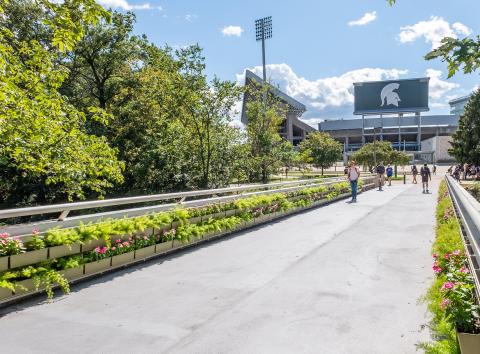 and long-standing regional sustainability challenges in water, energy and food nexus (WEF Nexus) in Asia, one of the core themes of the UN’s SDGs and Future Earth’s priority KANs (Knowledge Action Network). The established Asia Hub, launched in 2017 with Nanjing Agricultural University and other 22 international partner institutions in the region, is leading an effort to cope with the challenges imposed upon by the increasing climate variability in Asia and by the pandemic, by addressing the nexus of the agricultural food production, water use efficiency, hydropower dam construction, urbanization and regional economic disparities. Funded by different agencies multi-scale activities are being carried out with our Asia partners to disseminate science, technologies and policy recommendations to the local stakeholders, ranging from climate and hydrological modeling to land use and land cover change analysis, lake and wetland dynamics, hydropower dams assessments, agricultural irrigation, deforestation and livelihood changes in Asia. The broad global environmental challenges that Asia Hub is addressing include:
and long-standing regional sustainability challenges in water, energy and food nexus (WEF Nexus) in Asia, one of the core themes of the UN’s SDGs and Future Earth’s priority KANs (Knowledge Action Network). The established Asia Hub, launched in 2017 with Nanjing Agricultural University and other 22 international partner institutions in the region, is leading an effort to cope with the challenges imposed upon by the increasing climate variability in Asia and by the pandemic, by addressing the nexus of the agricultural food production, water use efficiency, hydropower dam construction, urbanization and regional economic disparities. Funded by different agencies multi-scale activities are being carried out with our Asia partners to disseminate science, technologies and policy recommendations to the local stakeholders, ranging from climate and hydrological modeling to land use and land cover change analysis, lake and wetland dynamics, hydropower dams assessments, agricultural irrigation, deforestation and livelihood changes in Asia. The broad global environmental challenges that Asia Hub is addressing include:
- Water-energy-food-land nexus in Asia
- Human interventions to hydrological processes of Lower Mekong River Basin
- Land use and land cover changes and implications to food, energy and water systems
- Regional climate change and its variability
- Science and technologies for solutions to food, energy and water nexus challenges
- Adaptation strategies and regional governance of water, energy and food systems
Did you know?
Michigan State University has been recognized for its significant progress toward meeting the United Nations’ Sustainable Development Goals. MSU is ranked No. 26 globally and No. 1 in the U.S. for SDG 17, “Partnerships for the Goals.”
Source: MSU Today MSU ranked highly for global impact on sustainable development
Indiana University
Fifty years ago, Indiana University’s O’Neill School of Public and Environmental Affairs was founded as the first school of its kind, combining public policy, management, and administration with environmental science. Through an explicitly international mission, the school, which was named after Paul H. O’Neill in 2019, sought to prepare students for public service in an increasingly complex and interconnected global society. From the start, the O’Neill School focused on applied problem solving, assembling teams to tackle pressing issues from water quality management to the impact of deregulation. The school developed strong and lasting partnerships with public agencies at all levels of government ensuring its interdisciplinary research led to real-world solutions.
Today, the O’Neill School is a world leader in public and environmental affairs and is consistently ranked in the top tier of programs in the environment. We offer multiple undergraduate, master’s, and doctoral programs in environmental science, management, and sustainability — including a top-ranked MPA specialty in environmental policy and management, an innovative one-year master’s program in environmental sustainability, and opportunities to specialize in pressing environmental science topics like conservation, water resources, energy, or environmental chemistry.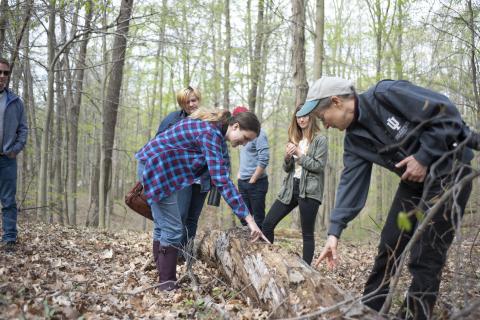
The O’Neill School’s graduate building is LEED Gold certified. In addition to state-of-the-art laboratory space on campus, O’Neill students have opportunities for hands-on scientific exploration through the field labs, campus farm, and more than 1,600 acres of protected wood- and wet-lands that make up IU’s Research and Teaching Preserve. All of these resources and experiences prepare our students to go out and lead informed environmental decision making in the real world. We have a broad and extensive range of alumni who are making a direct and positive impact on the environment today including an Environmental Protection Specialist with the U.S Environmental Protection Agency, a Landscape Conservation Design Specialist with the U.S. Fish and Wildlife Service, an Environmental Quality Analyst for the State of Michigan, a Policy Regulatory Planner for the Midcontinent Independent System Operator, an Ecologist Coordinator for the Arkansas Department of Agriculture, Natural Resources Division, a Wetlands Project Manager for Indiana Department of Environmental Management, a Wetlands Specialist with Burns & McDonnell, a Park Ranger with the National Parks Service, and many, many more.
Did you know?
Among the many O’Neill scholars who have made a profound and lasting impact on global environmental affairs are Professors Lynton K. Caldwell (1913-2006) and Elinor Ostrom (1933-2012). Caldwell, the principal architect of the National Environmental Policy Act, inspired more than 100 similar laws throughout the world. Ostrom’s research on the governance of common-pool natural resources such as forests and fisheries earned the Nobel Prize in Economics in 2009. Many O’Neill faculty members continue her research mission through the Ostrom Workshop, which also honors her late husband and colleague, Vincent Ostrom.
Duke University
Duke University has been a GCSE member since 2009. Duke University’s Nicholas School of the Environment provides opportunities for purpose-driven individuals to learn about or pursue careers that make positive contributions to the environment and the world. Students of the Nicholas School are bright, talented and ambitious people from across the globe who study a broad range of environmental topics including conservation, climate change, and everything in between.
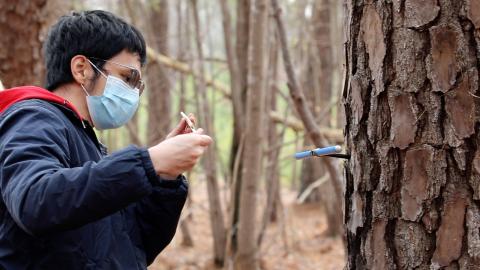
The Nicholas School is located in North Carolina in a region known as the Research Triangle. The school is located in close proximity to marine, forest, and mountain ecosystems and boasts world-class facilities and research centers. The 70,000-square-foot home of the Nicholas School has been designed to meet or exceed the criteria for LEED Green Building platinum certification, and incorporates state-of-the-art green features and technologies inside and out.
In addition to the Nicholas School’s main facilities, they also boast a Marine Laboratory located in coastal, historic Beaufort, North Carolina. The Marine Laboratory operates year-round to provide educational, training, and research opportunities to about 3,500 people annually.
The Nicholas School develops environmental leaders through an undergraduate academic program designed to provide an understanding of the Earth and of environmental ethics and a professional master's program that provides the next generation of environmental professionals with the skills needed to devise and implement effective environmental policies and practices in the public, private, and non-profit sectors. The PhD program is dedicated to developing world-class scientists, researchers, and educators in the environment.
Did you know?
The Duke Forest - another important resource for Nicholas School students and faculty - comprises just over 7,000 acres of land, lying primarily in two counties adjacent to the Duke University campus in Durham, North Carolina. This forest is used primarily as a resource for educational and research opportunities.
Bahir Dar University
Bahir Dar University is a public university in Ethiopia with strong commitments to regional sustainability and environmental education. Bahir Dar currently offers a bachelor’s degree in water resources engineering and master’s degrees in engineering hydrology, irrigation, and environmental engineering. Bahir Dar Energy Center does research in renewable energy sources and accessibility to rural households; it also offers graduate studies in sustainable energy. Researchers at Bahir Dar have recently been working to find an innovative approach to increasing water sustainability. Bahir Dar also works with farming communities to educate them about sustainable farming technologies and more nutritional crop production.
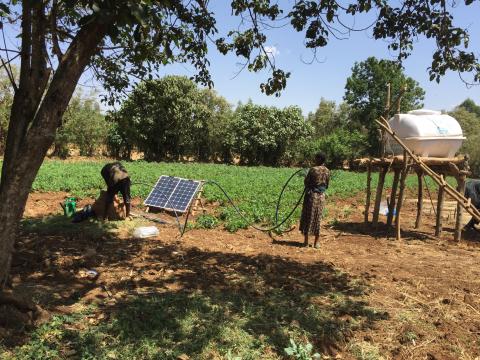
Bahir Dar University is involved with sustainable water management and integrated ecosystems design for the region. This includes interventions to improve crop productivity per unit area or provide access to alternative energy so that energy access, incomes, and nutrition levels of smallholder farmers can improve without compromising the environmental sustainability in the highland.
Bahir Dar Institute of Technology at Bahir Dar University has developed programs in water resources education and research. Bahir Dar also offers a water resources engineering and management PhD program, whose students have produced and published their work in scientific journals since 2013. Blue Nile Water Institute was established in 2003, and also helps strengthen the multi-disciplinary collaborative research in water resources at Bahir Dar. Students research integrated and innovative approaches to increase water sustainability in the Ethiopian Highlands. This research recommends finding ways to capture greater quantities of water during Ethiopia’s 4-month rain season.
Did you know?
As part of the National Green Legacy to build a green climate resistant economy, Bahir Dar University has planted more than 5,000,000 trees in the northwestern part of the Ethiopian highlands since 2019 and will continue planting 1,000,000 trees every year as part of the Government’s plan to plant 20 billion seedlings by 2024. (Demeke, H. (2020, July 18). Ethiopia: National Green Campaign Underway Aimed At Greening Ethiopia. The Ethiopian Herald. Retrieved February 8, 2022)
The Ohio State University
The Ohio State University (Ohio State) is a land-grant research university with more than 600 faculty and research scientists in sustainability education and research; thousands of passionate students who take advantage of 900 courses that support sustainability learning; an enduring mission to serve its local and global communities; and a strong commitment to sustainability in its campus operations.
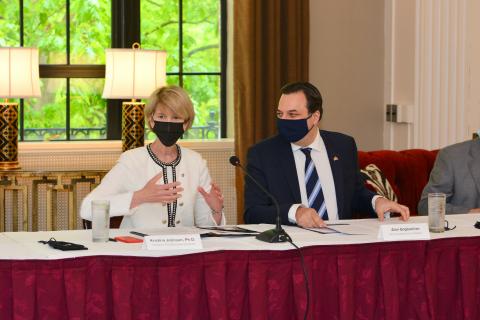
The complex challenges of sustainability and the need to improve social, economic, and environmental conditions underscore the need for the deep integration Ohio State has across a breadth of disciplines including natural and physical sciences, social and behavioral sciences, engineering, public health, business, law, planning, policy, arts, and humanities. These academic units and other internal partners such as research labs and centers, Student Life department, and Administration and Planning departments collaborate and leverage its research and knowledge toward a more sustainable and resilient campus and local and global communities.
Climate change is perhaps the most complex sustainability challenge Ohio State is tackling, from a new undergraduate carbon neutrality course taught by university President Kristina Johnson, to carbon sequestration and mitigation research innovation, to establishing ambitious operational carbon neutrality goals. As President Johnson said to the United Kingdom’s Ambassador to the United States team during their visit to Ohio State’s campus in advance of COP26: “We’re here unified toward one goal: Some people say to save the planet; I actually say to save civilization.”
Did you know?
Between 2015 and 2020, Ohio State reduced per capita potable water consumption by 29%, or 379 million gallons, saving the university $1.75 million in annual water purchase and sanitary sewer use costs.
Alex Ekwueme Federal University, Ndufu-Alike
The Centre for Climate Change and Development at Alex Ekwueme Federal University Ndufu-Alike, Ebonyi State, Nigeria is edging towards becoming a world-class think tank and leading centre of research, innovative learning, and policy guidance on climate change, environmental sustainability, and green development in Nigeria and Africa as a whole. The centre cultivates local knowledge on climate change, builds capacities, and raises the quality of Nigerian think tank research to international standards. It facilitates genuine and solid relationships among international and African academic, government, NGO, and private sector entities, generating a better understanding of the complex challenges and opportunities related to addressing poverty and inequality in Africa through the lens of the green economy.
The Centre for Climate Change and Development has an interdisciplinary approach with emphasis on four focal areas: (i) Climate Policy and Justice, (ii) The Green Economy and Sustainable Development, (iii) Climate Adaptation and Resilience, and (iv) Climate Information Services. The Centre brings together an extensive network of collaborators and provides a unique interface between science, management, humanities, and technology that is vital for cutting-edge research in these areas.
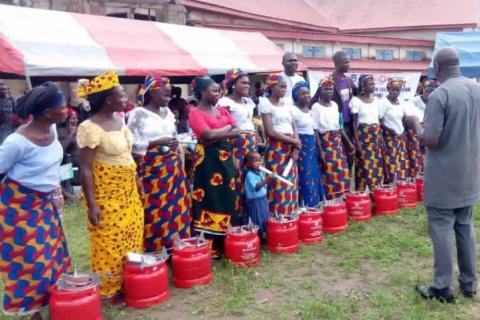
The sustainability efforts of the Centre include:
- Enhancing Liquefied Petroleum Gas Access for Semi-Urban Populations in Nigeria, a program that encourages residents to move from unhealthy and environmentally damaging ‘dirty cooking’ towards cleaner cooking stoves, and is DFID funded in partnership with Techno Oil and Africare;
- Promoting Public Engagement with Nigeria’s Nationally Determined Contribution (NDC) Revision and Climate Action, a World Resources Institute funded project providing independent critical analysis and input into the revision of Nigeria’s Nationally Determined Contribution (NDC);
- The Nigeria Deep Decarbonization Pathways Project (DPP), a collaboration between French Development Agency (AFD) and The Foundation Institut du Développement Durable et des Relations Internationales (IDDRI) that builds the capacities of African researchers to produce robust analyses of country-specific low-emission and policy relevant development scenarios and strategies; and
- Engaging A Critical Mass of Change Agents Through Climate Action, a project funded by the Association of Commonwealth Universities in partnership with Dr. Jennifer Rudd, aimed at educating a critical mass of teachers on climate change and carrying out climate actions including the formation of climate change clubs and tree planting exercises in schools.
Did you know?
Nigeria’s first 2.8MW solar hybrid plant was commissioned at Alex Ekwueme Federal University as part of the Energising Education Programme (EEP), an initiative of the Federal Government of Nigeria in collaboration with the Rural Electrification Agency and the National Universities Commission.
Harvey Mudd College
Harvey Mudd College recognizes sustainability as one of this century’s biggest challenges and is committed to seeking new ways to address climate change and to reducing its impact on the environment.
The centerpiece of Harvey Mudd’s sustainability effort is the Hixon Center for Climate and the Environment, a locus for new climate studies courses as well as other curricular, co-curricular, and research endeavors at Harvey Mudd and the Claremont College consortium.
Since 2008, when Harvey Mudd President Maria Klawe signed the Presidents’ Climate Commitment, the College has implemented many programs and initiatives to reduce its carbon footprint and overall energy use, including constructing new campus buildings that meet the U.S. Green Building Council’s LEED Silver standard (or equivalent), using electric vehicles, increasing employee rideshare, composting on campus, recycling, decreasing water and electrical use, and reducing waste. Faculty, students, and staff are deeply engaged in creating new academic courses, research projects, and internships in environmental studies and sustainability.
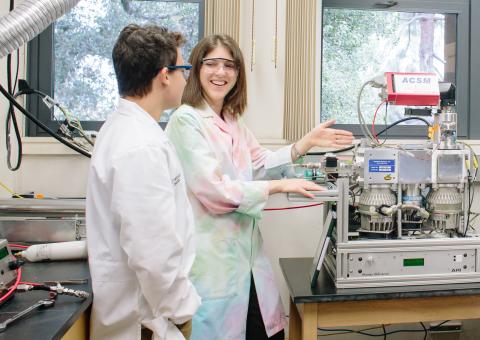
Harvey Mudd’s sustainability efforts have included:
- Establishing the Hixon Center for Sustainable Environmental Design that provides courses, research, and data gathering on sustainability
- Creating an HMC Sustainability Committee to establish and implement the College’s Sustainability Program
- Approving a policy that new buildings on campus meet at least the U.S. Green Building Council’s LEED Silver standard (or equivalent) and premium-rated or ENERGY STAR-certified products be purchased for use on campus wherever possible
- Adopting a College Sustainability Policy Statement
- Creating a Green Fund for new Facilities and Maintenance projects that increase sustainability (two recent projects included a campus-wide LEED retrofit project and a Smart Lab project)
- Implementing many programs and efforts to reduce energy use, increase rideshare, reduce waste, compost on campus and create new courses, research projects and internships in environmental studies and sustainability
- Submitting the college’s first-ever STARS Report (Sustainability, Tracking, Assessment and Rating System) to AASHE, and being rated STARS Bronze, thus achieving a STARS rating for the first time in college history.
- Replacing turf with low water consumption landscaping
- Building a solar photovoltaic cell carport which supplies around 10% of the College’s power needs
- Installing new dual port EV charging stations
- Installed ceramic window film tint to Sprague Library and Platt Campus Center exterior windows to reduce the building energy consumption of the HVAC system
Did You Know?
In 2015, Harvey Mudd created the Green Fund, which provides financial support for improvements to the campus that support the College’s sustainability efforts while reaping financial benefits over time.
Heritage University
Heritage University (HU) has been a GCSE member for over 10 years and is located on the ancestral homelands of the Yakama Nation in Washington State. As one of two universities in the United States that is both a Hispanic Serving Institution (HSI) and a Native American Serving Nontribal Institution (NASNTI), HU is committed to providing opportunities for underrepresented students to participate in STEM research, internships, and hands on programs at the intersection of environmental and social issues.
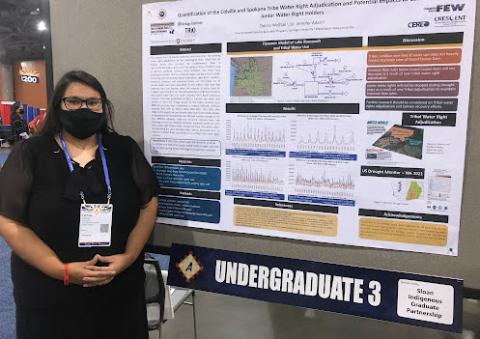
The Heritage University Chapter of GCSE EnvironMentors is housed in the Center for Indigenous Health, Culture & the Environment (CIHCE). High school students from the Yakama Nation Tribal School conduct research on topics that include community air quality and natural resource management in forestry, wildlife and fisheries. The high school students are assigned HU undergraduate Environmental Science majors in the role of near-peer mentors. They are also paired with HU STEM staff, faculty and community mentors from the Yakama Nation and Ecotrust. While the COVID-19 pandemic initially presented challenges, the HU EM chapter was able to successfully pivot to distance education, utilizing trail cameras and Zoom. Dedicated partners from Yakama Forest Products uploaded videos of animals captured by the trail cameras and students were able to develop hypotheses, analyze the data, and complete research posters. This program was featured in Northwest Public Broadcasting in 2020.
HU also provides their Environmental Science & Studies students with international study abroad experiences in Panama and Costa Rica, with the goal of building global partnerships to empower indigenous peoples and promote sustainable culturally vibrant communities. The CIHCE runs the Panama-Heritage University Indigenous Intercambio Program (PIIP), a science and cultural exchange that emphasizes mutual learning and interconnectedness between Indigenous communities around the world. Native American and Latinx STEM students from Heritage University collaborate with Indigenous community members from the Ngäbe and Buglé Indigenous peoples of Panama on scientific research and community development projects. The CIHCE devotes significant effort to fundraising to ensure that all costs are covered for student participants, including stipends, thereby lessening the financial barrier that often prevents LatinX and Native American students from engaging in international study abroad.
Did you know?
The Heritage University People of the Big River Field Class connects students with tribal elders, scientists, and natural resource managers across the PNW region for a unique study that blends Western science with traditional ecosystem knowledge.